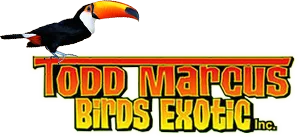Pet birds make loyal and beautiful companions when you show them the love and care they deserve. If you’re thinking about adopting one or more feathered friends, you probably have quite a few specific questions about their care and keeping. To start with, your bird will need a spacious place to live!
One of the most common questions we receive is — “What kind of cage does my bird need?” The answer can get complicated since it depends on the bird, but there are a few factors that you should consider when picking out the right cage. Here’s what you need to know!
Bird Size
The first thing you’ll need to consider when choosing a bird cage is the size of your bird(s). After figuring out the type of bird that you’d like to adopt, look into recommended cage size range, and purchase the largest cage for the range. This gives your bird the most comfortable living space, with plenty of room to grow.
Bird Habits
Every bird is a little different since they all have their own personalities. However, different types of birds are more prone to certain behaviors than others. Be sure to read up on your bird’s habits before you choose a cage. Here are some questions to find answers to:
- Does your bird prefer more horizontal space or more vertical space? (Most birds prefer vertical space, but this can vary.)
- Does your bird’s species enjoy a specific type of perch or toy? If this is the case, don’t forget to include it in your cage setup.
- Does your bird like to be kept in a quiet environment, such as a back room? Or do they prefer being near all the excitement?
Cage Features
Cage Material
By their nature, birds are prone to chewing on anything they can get their beaks on. Even if you provide them with plenty of toys, treats, and stimulation, small birds’ and larger birds’ beaks alike can still do a number on the cage material over time. That’s why it’s important to select a durable material. Both stainless steel and powder-coated steel are good choices for your bird.
Bar Spacing
Bar spacing is an important cage feature you’ll need to consider carefully. Different species of birds require different amounts of space between the cage’s bars. The smaller the bird, the easier it is for them to slip through wide bars. As a general rule, your cage bars should be close together enough so that birds’ heads can’t poke through but not so narrow that their claws or wings can become trapped. You should always research bar specifications based on your specific bird. Below are a few recommended dimensions:
- Canaries, parrotlets, and budgies: 3/8″ to 7/16”
- Small cockatiels: 5/8″
- Large cockatiels, small conures, and small parrots: 1/2″ to 3/4″
- African Gray parrots, small cockatoos, and large conures: 3/4″ to 1”
- Macaws, large Eclectus parrots, and large cockatoos: 3/4″ to 1.5”
Wheels or Casters
Bird cages with wheels or casters can be significantly easier to clean or move around. However, if you have carpeted floors, live with small children, or have invested in a cage that’s already relatively easy to clean, this option may not be necessary.
Perches & Toys
All bird cages need perches so that birds can rest and groom themselves. They also need a variety of toys available, so they don’t become stressed or bored. Be sure to include at least two perches (each made of different materials) per bird, and don’t forget to provide a variety of bamboo logs, Crazy Tails, or other essential bird toys in the enclosure.
Cage Location
Now that you’re almost ready to buy a bird cage, there’s something else worth thinking about — the location where you’ll be placing said cage. Here are a few tips to keep in mind when deciding on the right spot for your bird’s bedroom:
- Choose a location where the cage is easily accessible. This will make feeding, care, and cleaning much easier.
- Don’t place the cage in a child’s room. The child might tip the cage, get their fingers stuck in the bars, or end up harming themselves in another way.
- Avoid placing the cage near temperature hazards such as space heaters, wall heaters, AC units, wood-burning stoves, HVAC vents, and fireplaces.
- Keep the cage away from doors and windows.
- Never put the cage in the kitchen, even for a moment. Not only are there hot temperatures, but also certain cookware fumes can threaten the health of your feathered friend.
When in Doubt, Ask the Experts!
It can be overwhelming to choose a cage that feels “right.” If you’re still stumped after reading this article, your best bet is to seek out advice from a reputable business that truly cares about birds. The “decorative” cages available in big-box stores or even some chain pet stores should never be considered. Much like how true fishkeepers disavow fishbowls, anyone who cares for birds quickly lets you know that decorative cages just don’t cut it. These cramped, cheap-o cages are too small to provide a healthy environment for birds, and they’re often made from toxic materials to boot.
Buy Your Bird the Best!
We hope you’re ready to choose the perfect cage for your parrot, cockatoo, canary, or conure. If you have questions about keeping birds or want to order some of the best bird products on the market, don’t hesitate to contact our team! We’re passionate about all types of birds and want to help your pet be as happy as possible in its new home. Good luck bonding with your new bird buddy!







